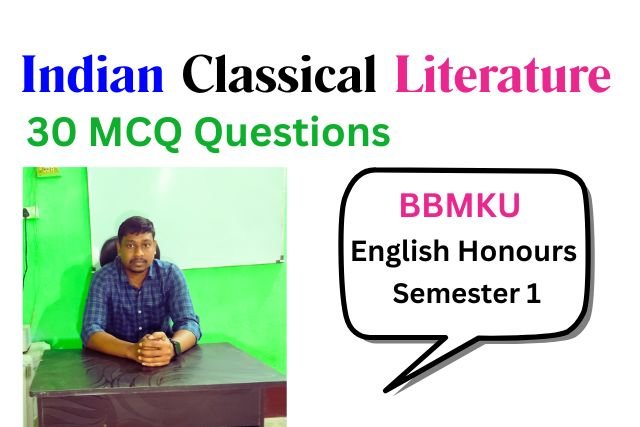Indian Classical Literature MCQ: Join us as we embark on a journey through timeless classics such as the Ramayana, Mahabharata, Bhagavad Gita, and more. Whether you’re a student preparing for exams or simply a literature enthusiast, our videos provide valuable insights and analysis to enhance your understanding.
Indian Classical Literature MCQ
Q.1. In the epic Ramayana, Sita was the wife of Lord ___
a. Vishnu
show ans
Q.2. The Mahabharata is believed to be written by Sage ___
a. Vyasa
show ans
Q.3. The primary language of the Bhagavad Gita is ___
a. Sanskrit
show ans
Q.4. The hero of Kalidasa’s play “Shakuntala” is ___
a. Duryodhana
show and
Q.5. The main character in the story of “Panchatantra” is ___
a. Krishna
show ans
Q.6. The author of “Meghaduta” is ___
a. Valmiki
show and
Q.7. The term “Rasa” in Indian literature refers to ___
a. Emotion
show ans
Q.8. The name of the epic in which Bhima is the central character ___
a. Ramayana
show ans
Q.9. The king in the story of “Vikram and Betal” is ___
a. Vikramaditya
show ans
Q.10. The form of Indian Classical drama known for its musical elements is ___
a. Natya Shastra
show ans
Q.11. The hero of the Sanskrit play “Abhijnanasakuntalam” is ___
a. Bharata
show ans
Q.12. The god of love in Hindu mythology is ___
a. Indra
show ans
Q. 13. The famous Indian poet who composed “Geet Govinda” is ___
a. Kalidasa
show ans
Q.14. The work “Yajnavalkya Smriti” is related to ___
a. Astronomy
show ans
Q.15. The language in which the Rigveda is written is ___
a. Sanskrit
show ans
Indian classical literature English honours
Q.16. The author of “Raghuvamsha” is ___
a. Vyasa
show ans
Q.17. The famous Indian poet who wrote “Kumara Sambhavam” is ___
a. Tulsidas
show ans
Q.18. The god of fire in Hindu mythology is ___
a. Varuna
show ans
Q.19. The name of Lord Krishna’s charioteer in the Mahabharata is ___
a. Arjuna
show ans
Q.20. The author of “Panchatantra” is ___
a. Vishnu
show ans
Q. 21. The king in the story of “Shakuntala” is ___
a. Dushyanta
show ans
Q.22. The work “Ashtadhyayi” is associated with __
a. Medicine
show ans
Q.23. The author of “Arthashastra” is ___
a. Vyasa
show ans
Q.24. The language in which the Mahabharata is originally composed is __
a. Prakrit
show ans
Q.25. The main character in the story of “Vikram and Betal” is ___
a. Rama
show ans
Q.26. The name of the sacred river mentioned in the Rigveda is ___
a. Ganges
show and
Q.27. The term “Kavya” in Indian literature refers to ___
a. Poetry
show ans
Q.28. The hero of the Ramayana is ___
a. Vishnu
show ans
Q.29. The famous Indian poet who wrote “Meghaduta” is __
a. Vyasa
show ans
Q.30. The god of death in Hindu mythology is ___
a. Varuna
show ans
Video Lesson
VIDEO
Indian Classical Literature MCQ Questions: Test Your Knowledge Indian classical literature English honours, BBMKU sem 1 English honours, literature MCQ, Indian classical literature, English honours book, BBMKU English honours syllabus, literary terms in English literature, important objective question,
Related Content
